#lincoln assassination 1865
Text
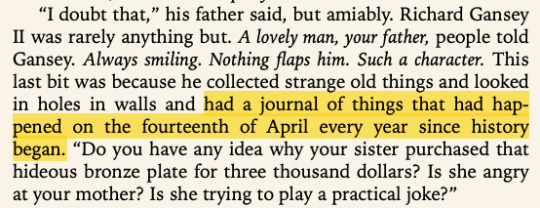
very important day for richard gansey ii apparently
#rchl#trc#the following happened on april 14th:#lincoln assassination 1865#mt vesuvius eruption 1906#john singer sargent death 1925#titanic iceberg collision 1912#amongst many other events listed in a wikipedia page i just spent 10 minutes staring at#mt vesuvius and sargent's death are not in that article but i had them written down in my chapter notes
385 notes
·
View notes
Text
dean walks into the war room one day to see what seems like jack and cas glitching in and out of the bunker while they point to different parts of the map table and dean is like guys what the fuck and cas is like i'm showing sam and jack my favorite points in world history and dean is like uhhh i don't see sam??? and jack is like oh yeah we left him at the petersen house in 1865 he really wanted to watch a play there for some reason and dean on a verge of a heart attack turns to cas like you took sam on a field trip to watch lincoln get assassinated???? and cas just deadpans no i left him there he wanted to take pictures
1K notes
·
View notes
Text
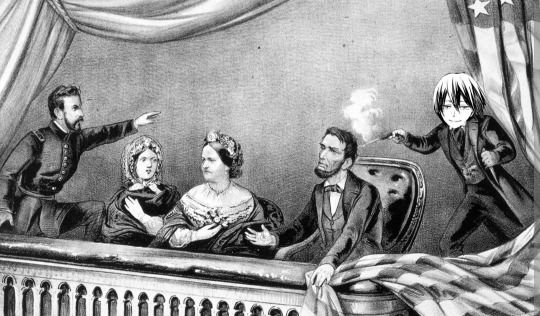
Fyodor Dostoevsky at Abraham Lincolns assassination, April 15, 1865!
400 notes
·
View notes
Text
🌿 Herb Of The Day

Title: Lilac
Gender: Feminine
Element: Water
Planet: Venus
📜 Folklore & History 📜
Lilacs are an old, old, species that originated in Persia and then traveled to Europe. They were brought to America in 1750 and then planted at New Jersey Governor Wentworth’s home. Other prominent men fell in love with lilacs. They were reportedly one of Thomas Jefferson’s favorite flowers, and he documented his lilac-planting-methods in 1767. George Washington followed suit and moved existing lilacs on his property to his garden in 1785.
In Greek mythology, Pan, the god of the wild, chased a nymph named Syringa. She turned herself into a lilac bush to escape Pan, and in anger, he broke off the reed-like branches which made pipes. With regret, he tried kissing the broken branches, and as his air pushed over them, sounds were made. Lilacs were responsible for the creation of “Panpipes.”
Russian folklore believed that hanging lilacs above a baby’s bed would bring the child wisdom.
American folklore thought that lilacs could drive away evil and that placing them in a haunted house would displace ghosts. Thought to be symbolic of “old love,” Victorian widows often wore lilacs as a sign of remembrance. One hundred and fifty-five years ago today, April 15th, Abraham Lincoln died after being shot by John Wilkes Booth. Any American — and much of the world — knows the story of the self-educated, country lawyer who became one of our nation’s most beloved presidents. But what many Americans might not realize is how the death of Lincoln reverberated into so many areas of our collective psyche, including literature and horticulture, thanks to Walt Whitman. Walt Whitman was a reporter, printer, writer, traveler and Civil War nurse who is considered one of America’s greatest poets. He self-published Leaves of Grass and worked on it throughout his lifetime, eventually modifying it so that there are eight different editions. Whitman felt a great affinity with President Abraham Lincoln, and when Lincoln was assassinated in the spring of 1865, Whitman grieved.
He wrote years later in Specimen Days about learning of the President’s death:
"I remember where I was stopping at the time, the season being advanced, there were many lilacs in full bloom. By one of those caprices that enter and give tinge to events without being at all a part of them, I find myself always reminded of great tragedy of that day by the sight and odor of these blossoms. It never fails."
While lilacs are first to bloom, their flowers are short-lived. The heady fragrance lingers sweetly at first, but then the blooms start to die, leaving a heavy, cloying smell. One of the first flowers of spring, lilacs contain a natural compound called indole that’s found in flowers — and feces. It’s that undercurrent of the “bottom note” of fragrance that suggests decay and death.

🔮 Metaphysical Properties 🔮
The beautiful May-blooming lilac is one of the loveliest tokens of spring. But they are much more than beautiful shrubs with showy, sweet-smelling flowers. Originally lilacs were planted to repel all evil. Planted near the entryway, lilacs were believed to send out protective vibrations. When the flowers are cut and brought into the home they cleanse any living space. And they'll also remove any unwanted spiritual presence. Blue and white varieties work well for this purpose. Since lilacs are ruled by Venus, they are also used in love spells. Try placing some pink lilacs on your altar while performing a love spell. The dried flowers make a powerful addition to any love sachet.

🍴⚕️ Culinary & Medicinal Properties
The simplest way to enjoy lilacs is as an infusion of the flowers for a lilac sugar. The sugar can then be used in recipes to add lilac flavor to baked goods. This also works with a lilac simple syrup which is just a liquid form of the same thing that’s perfect for making cocktails. For my money though, I think lilac infused honey sounds the best. The sweet floral flavor of lilacs translates beautifully into an ice cream base.
To prevent the recurrence of disease, lilac flowers were used to help strengthen the system and prevent relapse after a patient had healed. They’re said to be specifically good after cases of malaria. Tasting the raw flowers you can actually pick up some of the astringent qualities, as they make your mouth dry and pucker a bit (along with their floral flavors). This astringent quality makes them good for use in skin care products. Lilacs are used as a folk remedy for intestinal worms, as well as a treatment for gastric discomfort and gas. Regardless of the purpose, the most likely medicinal lilac preparation is a tincture, which is just a lilac infused alcohol
#elder witch#baby witch#beginner witch#dark witchcraft#herbalism#herbology#herbs#whimsigoth#witch aesthetic#witch herbs#divination#spirituality#spiritual#witchblr#witchcore#witchcraft#witch tip
471 notes
·
View notes
Text
"Thank you Mr. President"
Jackie Kennedy's letter to LBJ less than 24 hours after burying JFK
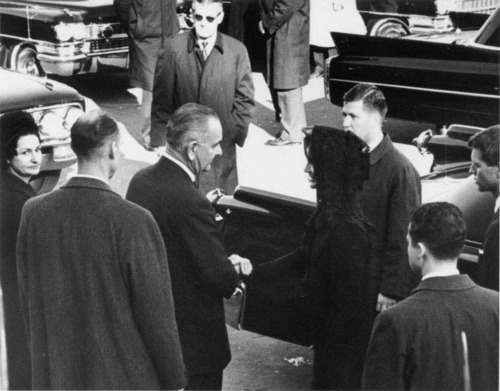
When Lyndon Baines Johnson was sworn in as President on board Air Force One at Love Field in Dallas, Texas on November 22, 1963, Jackie Kennedy was standing next to him, her pink Chanel dress, white gloves, and bare legs smeared with the blood and brain matter of her assassinated husband. Traumatized and almost certainly in shock, Jackie wanted to support the new President and new First Lady as power was officially transferred in the same solemn ceremony that has always marked such an occasion in American History. As the Presidential airplane left Dallas and returned to the nation's capital, Jackie sat in the back of the plane with the coffin containing her husband's body.
Despite her deep personal loss, her traumatic experience, and her obvious physical exhaustion, Jackie threw herself into planning President Kennedy's funeral as soon as she returned to Washington, D.C. Jackie was sensitive to the needs of the country and protective of her husband's legacy. When she arrived at the White House, she requested information about the exact specifications of Abraham Lincoln's funeral after he was assassinated in 1865. Even though it was the middle of the night, Kennedy staffers went to the National Archives and the Library of Congress to research the Lincoln funeral and Jackie helped make plans for the pageantry that would commence over the next few days. With a few minor exceptions, JFK's funeral was nearly an exact replica of Lincoln's funeral almost 100 years earlier. The effect was monumental. Kennedy's funeral will always be remembered as a dignified, iconic moment in our nation's history.
As Jackie Kennedy prepared to bury the 35th President, Lyndon Johnson consumed himself with becoming the 36th President, continuing Kennedy's work and leading the nation through the darkness of the assassination and its aftermath. When Air Force One landed at Andrews Air Force Base on the night of November 22nd, the Secret Service urged now-President Johnson to take a helicopter directly to the White House. Johnson immediately vetoed the move as he thought it would disrespectful for him to land on the South Lawn of the White House (as Presidents regularly do) while Kennedy's family still lived in the building. When LBJ arrived at the White House via motorcade to begin his work that night, the new President went directly to an office in the Old Executive Office Building rather than working out of the Oval Office.
Over the next few weeks, President Johnson extended many kindnesses to Jackie Kennedy. LBJ and Jackie had always had an extremely close relationship, and Johnson never forgot how kind Jackie had been when LBJ was Vice President -- a depressing time for Johnson due to his lack of power and influence. During his Vice Presidency, Johnson had experienced many problems with members of Kennedy's Administration, but was always treated very well by President and Mrs. Kennedy.
The Kennedys had two young children who had just lost their father, and the first thing that LBJ did as President was write two letters to President Kennedy's children to read when they were old enough to understand them. When JFK was elected President, the Kennedys hoped that their daughter Caroline would be able to attend a normal school with children her age. When it became apparent that the logistics wouldn't allow that, a room was prepared at the White House for Caroline's teacher to hold class daily. When JFK was assassinated, LBJ insisted that Caroline's class continue using the White House for classes as long as Jackie wished. In fact, LBJ urged Jackie to continue living in the White House throughout the entirety of his term. Jackie moved out within a few weeks, but she appreciated President Johnson's offer.
What Jackie Kennedy most appreciated, however, was President Johnson's presence at John F. Kennedy's funeral. On November 25, 1963, the entire nation stopped and world leaders gathered in Washington to bury the slain President (one place that the nation didn't stop was Dallas, where JFK's assassin Lee Harvey Oswald was shot and killed as he was being transferred to another police facility). Kennedy's funeral was historic and emotional. The enduring image is of John F. Kennedy, Jr. -- celebrating his 3rd birthday on that very day -- stepping forward to salute as father's flag-draped casket passed by.
Another stirring image from that day was accompanying President Kennedy's funeral cortége. As Kennedy's casket rested on the exact same caisson that carried Abraham Lincoln's casket, a remarkable procession of some of the most famous, powerful people in the world followed behind it. Led by Jackie Kennedy and the slain Presidents two brothers, Robert F. Kennedy and Edward Kennedy, scores and scores of political leaders, diplomats, monarchs, and more trailed the casket, marching in complete silence other than the sounds of their feet on the pavement. Dozens upon dozens of countries were represented -- not just by ambassadors or minor officials, but by Kings, Queens, Emperors, Presidents, and Prime Ministers. When one looks at the photos, our eyes are immediately drawn to the majestic strength of Jackie Kennedy leading the procession. If the faces of those behind her are scanned, they reveal legendary leaders such as Charles de Galle, Haile Selassie, U Thant, Golda Meier, King Baudoiun I, Lester Pearson, Willy Brandt, Queen Frederica, Eamon de Valera, Prince Philip, Sir Alec Douglas-Home, and scores of other international figures, not to mention the leading Americans, who took to the streets of Washington, D.C. -- on foot -- to honor President Kennedy.
It's often forgotten that Lyndon Johnson was there. Johnson was such a larger-than-life character and so rarely relegated to the background that it's difficult to imagine a scene where he would not be the major player. Since President Kennedy had been murdered in broad daylight on the streets of a major American city just three days earlier, the Secret Service -- understandably nervous due to their failure to protect one President that week -- was adamantly opposed to President Johnson's participation. Johnson overruled the Secret Service concerns and turned down their insistence that he ride in an armor-plated limousine. For maybe the only time in his life, Lyndon Johnson -- now President of the United States -- went virtually unnoticed to the public.
Yet, one person did notice. And, on November 26, 1963, despite all that she had been through; despite all that she was feeling; despite all that she had lost; despite the fact that just 24 hours earlier she had buried her husband, the father of her two young children, the 34-year-old widowed former First Lady Jacqueline Bouvier Kennedy sat down in the White House and wrote this letter to the new President of the United States, Lyndon Baines Johnson:
November 26
Tuesday
Dear Mr. President,
Thank you for walking yesterday - behind Jack. You did not have to do that - I am sure many people forbid you to take such a risk - but you did it anyway.
Thank you for your letters to my children. What those letters will mean to them later - you can imagine. The touching thing is, they have always loved you so much, they were most moved to have a letter from you now.
And most of all, Mr. President, thank you for the way you have always treated me - the way you and Lady Bird have always been to me - before, when Jack was alive, and now as President.
I think the relationship of the Presidential and Vice-Presidential families could be a rather strained one. From the history I have been reading ever since I came to the White House, I gather it often was in the past.
But you were Jack's right arm - and I always thought the greatest act of a gentleman that I had seen on this earth - was how you - the Majority Leader when he came to the Senate as just another little freshman who looked up to you and took orders from you, could then serve as Vice President to a man who had served under you and been taught by you.
But more than that we were friends, all four of us. All you did for me as a friend and the happy times we had. I always thought way before the nomination that Lady Bird should be First Lady - but I don't need to tell you here what I think of her qualities - her extraordinary grace of character - her willingness to assume ever burden - She assumed so many for me and I love her very much - and I love your two daughters - Lynda Bird most because I know her the best - and we first met when neither of us could get a seat to hear President Eisenhower's State of the Union message, and someone found us a place on one of the steps on the aisle where we sat together. If we had known then what our relationship would be now.
It was so strange - last night I was wandering through this house. There in the Treaty Room is your chandelier, and I had framed - the page we all signed - you - Senator Dirksen and Mike Mansfield - underneath I had written "The day the Vice President brought the East Room chandelier back from the Capitol."
Then in the library I showed Bobby the Lincoln Record book you gave - you see all you gave - and now you are called on to give so much more.
Your office - you are the first President to sit in it as it looks today. Jack always wanted a red rug - and I had curtains designed for it that I thought were as dignified as they should be for a President's office.
Late last night a moving man asked me if I wanted Jack's ship pictures left on the wall for you (They were clearing the office to make room for you) - I said no because I remembered all the fun Jack had those first days hanging pictures of things he loved, setting out his collection of whales teeth etc.
But of course they are there only waiting for you to ask for them if the walls look too bare. I thought you would want to put things from Texas in it - I pictured some gleaming longhorns - I hope you put them somewhere.
It mustn't be very much help to you your first day in office - to hear children on the lawn at recess. It is just one more example of your kindness that you let them stay - I promise - they will soon be gone -
Thank you Mr. President
Respectfully
Jackie
At the LBJ Library on the campus of the University of Texas in Austin, there are many displays of priceless, historic artifacts that tell the story of the years of Lyndon Johnson, his service to the United States, and the world that he knew. As you pass through the exhibits, it's difficult not to be astonished, inspired, and touched by what you see around you during your visit. Many of the things you'll see there will take your breath away, but nothing leaves an impression on your heart and soul like the seven pieces of paper containing these words in Jackie Kennedy's handwriting -- words that somehow convey strength and fragility, evoke optimism and sadness, and simultaneously project support while demonstrating a sense of loss that very few of us can imagine. Items like these are the source materials for what history truly is -- a biography of humanity, a story about people.
#History#JFK Assassination#Kennedy Assassination#Assassination of John F. Kennedy#JFK#John F. Kennedy#President Kennedy#Jacqueline Kennedy#Jackie Kennedy#First Lady#First Families#Death and State Funeral of John F. Kennedy#Funeral of John F. Kennedy#Presidents#Presidential History#Presidential Funerals#Presidential Deaths#Lyndon B. Johnson#LBJ#President Johnson#White House#Kennedy Family#Presidential Relationships#Presidential Correspondence#JFK's Funeral#60th Anniversary of JFK's Assassination#60th Anniversary#60th Anniversary of the Kennedy Assassination
117 notes
·
View notes
Text
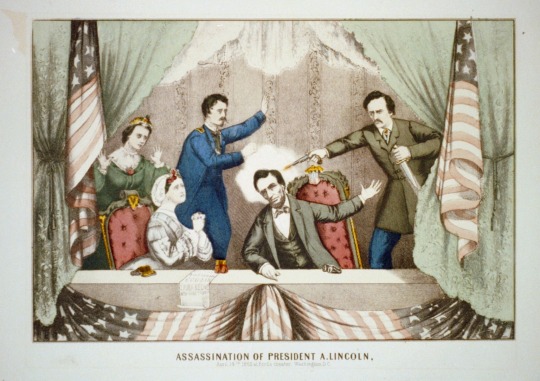
President Abraham Lincoln was shot at Ford’s Theatre in Washington, D.C. on April 14, 1865. The assassin, actor John Wilkes Booth, shouted, “Sic semper tyrannis! (Ever thus to tyrants!) The South is avenged.” Lincoln died the next morning. #OnThisDay
44 notes
·
View notes
Note
is abe lincoln the king of mars or does he just coincidentally look like that
That is debateable. If I recall correctly, he's never actually referred to as Abraham Lincoln in the show, and always as King of Mars. But I've always imagined there's some weird time travel stuff happening. The fact we hear a gunshot after his second death in Sons of Mars makes me think he was spirited away to become King of Mars in the moment of his assassination and then got sent back to 1865 again after he sacrificed himself to save Jake.
21 notes
·
View notes
Text

Lewis Powell (né Payne), one of the conspirators in the assassination of Abraham Lincoln who personally attempted to murder Secretary of State William H. Seward. Civil War photographer Alexander Gardner took this picture at the Washington D.C. Naval Yard, 27 April 1865. Two months later Powell was executed for his crimes.
#civil war#history#photography#anarchy#chaos#war#1860s#politics#crime#men#people#b&w#photos#alexander gardner#19th century#dark#lewis payne#prison#guys#abraham lincoln#american history#lewis powell
36 notes
·
View notes
Text
Japanese Culture Greg: Okay, so, the samurai were officially abolished as a caste in Japanese society during the Meiji Restoration in 1867.
Japanese Culture Greg: The first ever fax machine, the "printing telegraph", was invented in 1843.
Japanese Culture Greg: And Abraham Lincoln was famously assassinated at Ford's Theater in 1865.
Japanese Culture Greg: Which means there was a 22-year window in which a samurai could have sent a fax to Abraham Lincoln.
36 notes
·
View notes
Text
Chat Noir: Okay, so, the samurai were officially abolished as a caste in Japanese society during the Meiji Restoration in 1867.
Chat Noir: The first ever fax machine, the "printing telegraph", was invented in 1843.
Chat Noir: And Abraham Lincoln was famously assassinated at Ford's Theater in 1865.
Chat Noir: Which means there was a 22-year window in which a samurai could have sent a fax to Abraham Lincoln.
40 notes
·
View notes
Text
i learned that Abraham Lincoln signed the bill creating the Secret Service on April 14, 1865, the day he was assassinated (x)
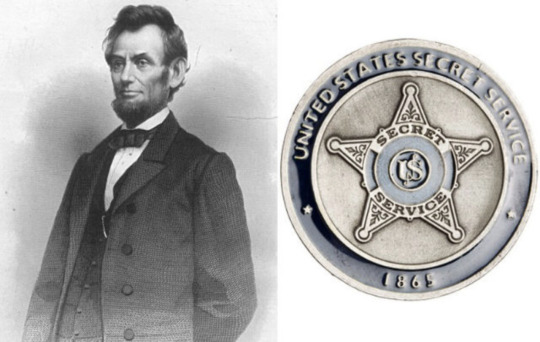
250 notes
·
View notes
Text

@story-courty I can corroborate! Edwin Booth, elder brother of John Wilkes and the man considered possibly the greatest actor of the nineteenth century, saved Robert Todd Lincoln from falling from a train platform in Jersey City, New Jersey. We don't know the exact date of the incident, but it most likely occurred sometime in 1863 or 1864, when Robert was returning to Washington from Harvard, and Booth was going to Richmond with John T. Ford, owner of (believe it or not) Ford's Theater.
The Library of Congress website provides a link to the April 26, 1865 edition of the Cleveland Morning Leader that tells the story like this.
Not a month since, Mr. Edwin Booth was proceeding to Washington. At Trenton, there was a general scramble to reach the cars, which had started, leaving many behind in the refreshment saloon. Mr. Edwin Booth was preceded by a gentleman whose foot slipped as he was stepping upon the platform, and who would have fallen at once beneath the wheels had not Mr. Edwin Booth's arm sustained him. The gentleman remarked that he had had a narrow escape of his life, and was thankful to his preserver. It was Robert Lincoln, the son that that great, good man who now lies dead before our blistered eyes, and whose name we cannot mention without choking.
In some way the incident came to the knowledge of Lieutenant General Grant, who at once wrote a civil letter to Mr. Edwin Booth, and said that if he could serve him at any time he would be glad to do so. Mr. Booth replied, playfully, that when he (Grant) was in Richmond, he would like to play for him there.
Robert Lincoln confirmed the story for the Century Magazine in 1909. (Possibly as part of nationwide centennial celebrations of Abraham Lincoln's birth).
The incident occurred while a group of passengers were late at night purchasing their sleeping car places from the conductor who stood on the station platform at the entrance of the car. The platform was about the height of the car floor, and there was of course a narrow space between the platform and the car body. There was some crowding, and I happened to be pressed by it against the car body while waiting my turn. In this situation the train began to move, and by the motion I was twisted off my feet, and had dropped somewhat, with feet downward, into the open space, and was personally helpless, when my coat collar was vigorously seized and I was quickly pulled up and out to a secure footing on the platform. Upon turning to thank my rescuer I saw it was Edwin Booth, whose face was of course well known to me, and I expressed my gratitude to him, and in doing so, called him by name.
Edwin Booth didn't know the name of the man he'd saved until 1865, when Adam Badeau, another officer on Grant's staff who Lincoln had told the story to, wrote him a letter about it. Booth was a staunch Unionist and admirer of Abraham Lincoln, and he'd been feuding with his younger brother for years because of his Confederate sympathies. The news of the assassination devastated him, and he later told a friend that one of the only things that got him through those dark months afterward was the knowledge that he'd saved Robert's life. People initially thought that the Booth name was too blackened for Edwin to continue his career in acting, but he made a triumphant return to the stage in 1866 for a performance of Hamlet that got rave reviews, and eventually opened his own theater and went on a worldwide tour.
I can't fail to mention that this is only one of the coincidences regarding presidential assassinations in Robert Todd Lincoln's life, because he is the only man to have been present at events surrounding three of the four assassinations of American presidents. He was present at his father's deathbed after the assassination (though he wasn't at the theater and always regretted it, because he would have been sitting at the back of the box between Booth and his father). In 1881, he served as Secretary of War under President James Garfield, and was with him at the train station when he was shot by a crazed office-seeker. Robert secured the services of the doctor who had cared for Abraham Lincoln--though, unfortunately, this doctor's overzealous methods, insistence on his own theories, and refusal to follow antiseptic practices caused the infection that actually killed Garfield more than two months later. In 1901, Robert Lincoln was working as president of the Pullman Palace Car Company when President William McKinley invited him to the Pan-American Exposition in Buffalo, New York where McKinley was making an appearance. At the same time Lincoln's train pulled in to the station, McKinley was shot by an assassin who'd joined the receiving line to meet him. Lincoln immediately went to the hospital to visit the injured McKinley, who died six days later.
Robert Lincoln was a major figure in the Republican Party whose name was often mentioned as a presidential candidate, but Robert never pursued the office, for what should be obvious reasons.
This blog from the U.S. National Archives sums up the situation well.
When Theodore Roosevelt assumed the Presidency, Lincoln wrote him. “I do not congratulate you for I have seen too much of the seamy side of the Presidential Robe to think of it as a desirable garment.” Later, he was invited to the White House as a figurehead of the Republican Party. He declined and swore he would never step foot in the White House again. “I am not going and they’d better not invite me,” he said, “because there is a certain fatality about presidential functions when I am present.”
#answered asks#history is awesome#presidential talk#story-courty#i knew this story before i started my lincoln deep dive this year#though it hadn't shown up in any of my reading yet#the only place it was mentioned was in the lincoln assassination episode of 'timeless'#where robert todd is a character and is given an ironic line about how his family owes a great debt to the booths#i'm glad to have had the chance to do a little digging and confirm the details
32 notes
·
View notes
Text

VOGUE US March 2024

On His Terms
by Sarah Crompton
With his red cap pulled down over horn-rimmed glasses, Tobias Menzies walks into a London hotel with the wariness of a man who might just be recognized. It's his face that would catch him out, those deep lines running from eyes to chin. "He had those even as a young man," says his friend the theater director Rupert Goold. "It's like someone has taken a knife and carved them. And I feel those lines run deep inside him as well. He's grown into his face like a lot of actors do."
Menzies's smile is warm and his handshake firm, and though he lives not far from here in north London's Crouch End, he is dressed more as a country dweller than a man-about-town, in jeans and blue gilet zipped over a soft mustard-and-red-checked shirt. Only his Grenson trainers, white and red and with flashes of the same yellow, suggest he might belong to an artier milieu.
"I don't get recognized on any intrusive level, but it's not a part of [the job] that I love," he admits as we settle down to talk. "I like to watch people—I don't like them to watch me." I've asked him about the experience he's having at 49—that of a talent stepping into his prime. Blame it on The Crown, in which he played the second incarnation of Prince Philip across two seasons (a role that won him an Emmy), and last year's wry, acclaimed comedy You Hurt My Feelings, in which he starred opposite Julia Louis-Dreyfus ("He's one of the most warm and present actors I've worked with," says its director, Nicole Holofcener). And now, he's appearing in two leading-man roles, as Edwin Stanton, Abraham Lincoln's secretary of war, in Apple TV+'s series Manhunt in March, and he's currently onstage in The Hunt, an adaptation of the 2012 Thomas Vinterberg film directed by Goold, playing at St. Ann's Warehouse in Brooklyn five years after its London premiere.
"I've got to be honest, I really liked it," Menzies says of the status he enjoyed in Manhunt. "Being in the engine room of it and part of the storytelling decisions." The series is part thriller and part history lesson, set over the 12 days following Lincoln's assassination in 1865 as Stanton attempts to track down the president's killer, John Wilkes Booth (it's based on historian James L. Swanson's 2006 bestseller). Episodes skip forward and backward, tracing the story of a tumultuous time and the ideological schisms that caused the Civil War and continued long after it. Stanton, a brilliant lawyer and strategist, is at the center of everything, clashing with Lincoln's successor, President Andrew Johnson, as he attempts to preserve the late president's legacy.
As gripping as any detective story, Manhunt addresses painful facts of America's past: "The implications of losing Lincoln and what that meant for African American people," says showrunner Monica Beletsky, who spent four years developing the project and who has followed Menzies's career since they overlapped as students at the Royal Academy of Dramatic Art (RADA) in London (she on a stint studying there from the US). "You could argue in a way that the Confederates won the peace," Menzies points out. "What is important about Monica making the show is that she is a person of color, and arguably the big fallout from Lincoln's assassination was that Reconstruction was lost until 100 years later and the Civil Rights Movement of the 1960s. Voting rights, land rights—they didn't happen. A lot of the things that African Americans have been fighting so hard for, for so long, were on Stanton's agenda."
Menzies studied carefully for the role ("He prepares months in advance," says Beletsky), working to find Stanton's voice and make his accent seem effortless, but also reading widely about the Civil War and its aftermath. Doris Kearns Goodwin's classic history Team of Rivals was a particularly rich source: "It takes you into this very disparate group Lincoln collected around him," Menzies says. "There was such a diversity of opinion and a lot of antagonism, but that was part of the power of it." Menzies also studied Gregory Peck's towering performance as Atticus Finch in To Kill a Mockingbird. "I was thinking of those archetypes that American literature and film are full of," he says. "Because it's such a whirlwind story with so many different characters floating through it—so you need a moral compass."
The key to the character became a combination of "stoicism and radicalism," Menzies says—and as an actor, he's exceptionally good at playing men who are fighting such opposing impulses, with strong currents of feeling running beneath an impassive surface. "He is one of those rare actors who does a lot with silence," Beletsky says. "He makes you believe you can feel what he is thinking, and he can do those things without saying a word."
Goold, who has directed Menzies many times onstage—including as Hamlet, as Valentine in Tom Stoppard's Arcadia, and as Edgar in King Lear—thinks this quality has become stronger as Menzies has grown older. "He's got this wonderful physical expressiveness, but there's a slightly remote quality to him, I suppose," Goold says. "The quality I find really compelling in him is his committed curiosity. It's quite rare, especially for British actors, to keep their craft developing, to become more rigorous and investigative, and I think Tobias is an outlier on that."
Menzies is attracted to roles that conceal depths. "There is a certain magic about that. Part of the maths is that there is more on the inside than on the outside"
Their most recent collaboration is The Hunt, a haunting story in which a small-town teacher becomes ostracized when a six-year-old child accuses him of abuse. Menzies will be reprising his devastatingly observed performance from the play's 2019 London premiere. "When we put it on, we felt it to be about false accusations and the way that cancel culture was creating pariahs," says Goold. "But it is as much about someone who is shut out from their community because they choose to live apart. There is part of Tobias that is like that."
Menzies acknowledges that he is attracted to roles that conceal depths. "It's partly a taste thing," he says. "I like the kind of acting where I can't see the performance, I can't see how it is happening. There is a certain magic about that. Part of the maths is that there is more on the inside than on the outside, there's a kind of mystery there."
Menzies was born in London, his father a radio producer for the BBC, but after his parents separated when he was six, he lived with his mother, a drama teacher, and his brother in Kent. On their regular cultural outings, he was inspired by contemporary dance and the experimental theater companies he saw: Pina Bausch, Complicité, Shared Experience, Cheek by Jowl. "I was interested in companies that were making their own work," he says, "and I tried to go to train with [the radical movement coach] Jacques Lecoq in Paris; but I didn't have the money for that, so I went to RADA."
He never dreamed of being a famous actor. "My obsession as a kid was tennis," he says, with a grin. He was good enough to be on the fringes of the team for the county of Kent but gave it up when he realized he would never be truly first-class. He stopped playing for a long time. "Periodically I would pick up a racket and try to play a bit, and my game had completely fallen apart and it made me so angry. It was so frustrating. A few years ago I thought, Let's start again, do my 10,000 hours, and let's fix it." He approached the task with "monomaniacal" intent, working for a year on his forehand, and a year on his backhand, then adding his serve. Now he plays three times a week at a local tennis club, either with a coach or taking on other members in clay court matches. "I'm pretty obsessive about it," he says. "I just find it fascinating. It is such a mental game—a very interesting microcosm of one's brain."
His hero is Novak Djokovic. "He has less natural flair than Nadal or Federer but there is an epic quality to his tennis. He is able to endure and suffer, and so he can do it all in some way. There is a sort of purity to what he is doing. I think only if you have struggled with tennis do you realize that even though it looks plain, what's going on, the footwork, the ability to get to that ball and then hit it—it's just rather remarkable."
Menzies admits that his attitude to life mirrors his tennis. "I am probably on the methodical end of things, yeah," he says, with another low laugh. I ask about his film roles, which have been getting bigger and richer of late. He loved filming in New York with Holofcener on You Hurt My Feelings—"It was definitely bucket list"—and is currently appearing alongside Brad Pitt in the as-yet-untitled Formula 1 drama directed by Joseph Kosinski, which is filming scenes at Grand Prix around the world.
Before the actors' strike interrupted production, they had shot two scenes at Silverstone in the UK. "It was bonkers because we are in amongst everything else. So we did this scene on the grid before the race and the grid is live: real drivers, real cars, celebrities wandering around." He pauses, then adds: "It was like theater on steroids—really, really fun." He has nothing but praise for Pitt—"a lovely, lovely person, very collaborative, very nice to act with, and supersmart"—but working with him brought Menzies face-to-face with a level of fame that he doesn't aspire to. "How does he go out? It is very constraining to have that level of visibility."
Partly from a desire to preserve his anonymity as much as he can, Menzies took an early decision never to talk about his private life. "Is that old-fashioned of me?" he asks. "I'm going to stick to my guns. It's partly natural shyness on my part. But to be a bit more grandiose about it, the idea of celebrity moving into the arts and acting does have an effect on how we watch."
Through it all Menzies is genial and engaged, asking a lot of questions, yet there is something formal about him too. This is someone who is deeply serious about acting, pursuing projects that interest him and then immersing himself in them. I ask if being able to choose work of quality and interest is part of this new level of success, and Menzies says that it has come at a good time. "The question for me would have been whether as a younger person I would have handled it very well," he tells me. "I just think at some base level, it has taken me time to get really good." He laughs gently. "If I'd had a lot of exposure early on, I don't think I'd have been ready. I know I am a lot better now than I was 10 years ago. Acting keeps you very humble because you never quite know day-to-day. You can do all the work in the world and try the best you can, and sometimes it just lifts off and sometimes it doesn't."
9 notes
·
View notes
Text
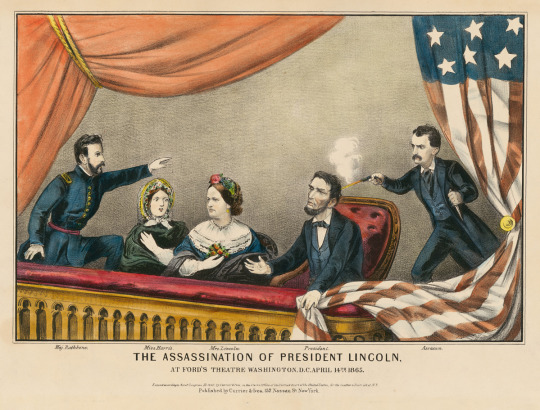
Today is the 159th anniversary of Abraham Lincoln's death, which took place at 7:22 AM on April 15, 1865, about nine hours after he was shot in the head by John Wilkes Booth at Ford's Theatre. So check back throughout the day for a few posts about Lincoln, the assassination, and Booth.

#History#Abraham Lincoln#President Lincoln#Assassination of Abraham Lincoln#Lincoln Assassination#Death of Abraham Lincoln#Presidents#Presidential History#John Wilkes Booth#Presidential Assassinations#Presidential Assassins#Civil War#Civil War History#Anniversary of Lincoln's Death#Presidential Deaths
22 notes
·
View notes
Text

LETTERS FROM AN AMERICAN
February 4, 2024
HEATHER COX RICHARDSON
FEB 5, 2024
On February 4, 1870, the Chicago Tribune announced: “The rebellion may now be regarded as over and the great war finished.” Referring to the Civil War, which had ended just five years before, the paper’s editor explained: “That rebellion was undertaken to preserve and perpetuate human slavery, and, within ten years from the date of the first secession ordinance, the great struggle has been terminated in the adoption of the Thirteenth, Fourteenth, and Fifteenth Amendments….”
On the previous day, February 3, 1870, enough states had ratified the Fifteenth Amendment to make it part of the U.S. Constitution. The Fifteenth Amendment was the last of the three Reconstruction Amendments, added to the U.S. Constitution both to bring the United States closer to the ideal of liberty promised in the Declaration of Independence and to make sure that insurrectionists could never again try to destroy the nation.
Key to that protection was cementing into the nation’s fundamental law the power of the federal government over the states.
Congress passed the first of the three Reconstruction Amendments, the Thirteenth, in January 1865, and the states ratified it on December 6 of the same year. The Thirteenth Amendment abolished human enslavement in the United States, except as punishment for a crime (an exception that later enabled the use of chain gangs). President Abraham Lincoln and the congressmen who embraced this monumental change to the Constitution expected that ending enslavement would end the power of a few elite southerners to dismantle the United States.
Enslavement, they believed, had enabled a few men to monopolize wealth and power in the American South, where they dominated state governments and wrote laws to protect their own interests. Those same men had taken over first the Democratic Party and then the national government, controlling the Supreme Court, the Senate, and the presidency.
The elite southerners insisted that the national government had no power to do anything that was not spelled out in the Constitution. It could protect the property interests of enslavers—through a law forcing free states to return escaped slaves, for example, or laws protecting enslavement in the western territories—but it could not do anything to help ordinary Americans, like dredging harbors, building roads, or establishing colleges, no matter how popular those measures might be.
During the Civil War, Lincoln and the Republicans rejected this old formula and created a new one. They pioneered a government that responded to the interests of ordinary Americans. Amending the Constitution to end enslavement was not simply an attempt to guarantee freedom for Black Americans; it was also designed to cement in place the government “of the people, by the people, for the people.”
Demonstrating that momentous change, the second section of the Thirteenth Amendment added: “Congress shall have power to enforce this article by appropriate legislation.” The first ten amendments to the Constitution—the Bill of Rights—limited the power of the federal government. The Thirteenth was the first to expand it.
Republicans knew that Black southerners supported this new government. They believed that poorer white southerners who had been crushed economically before the war as wealthy white enslavers gobbled up the region’s best land and who had borne the brunt of the war would also embrace it. Under the Republicans’ new system, the North had defied all expectations and thrived during the war, and Republicans thought its superiority to the old system was so obvious that ordinary southerners would jump at it.
Many did…but white lawmakers in the southern states did not. They agreed to ratify the Thirteenth Amendment, but enabled by President Andrew Johnson, who took over the presidency after Lincoln’s assassination, they passed a series of laws that bound Black Americans to yearlong contracts working in white-owned fields, prohibited Black Americans from meeting together or owning guns, demanded that Black Americans behave submissively to white Americans, and sometimes punished white people who interacted with their Black neighbors.
The Chicago Tribune wrote, “The men of the North will turn the State of Mississippi into a frog-pond before they will allow any such laws to disgrace one foot of soil in which the bones of our soldiers sleep and over which the flag of freedom waves.” To counter these “Black Codes,” Congress wrote the Fourteenth Amendment in 1866, and the states ratified it in 1868.
Congress designed the Fourteenth Amendment to end forever the ability of state lawmakers to undermine the United States of America. The amendment declared anyone born or naturalized in the United States to be a U.S. citizen and then established the power of the federal government to stop states from discriminating against citizens. The Fourteenth Amendment establishes that states must treat everyone equally before the law, and they can’t take away someone’s rights without due process of the law.
With the Fourteenth Amendment, Congress tried to protect voting rights by establishing that states that did not permit Black men to vote would lose representation in Congress in proportion to the number of people they disfranchised. It also barred from office anyone who had previously taken an oath to support the Constitution and then “engaged in insurrection or rebellion against the same, or given aid or comfort to the enemies thereof.” Finally, to guard against former Confederates undermining the nation by refusing to honor its debt, Congress added that “[t]he validity of the public debt of the United States, authorized by law…, shall not be questioned.”
Once again, the amendment gave Congress the “power to enforce, by appropriate legislation, the provisions of this article.”
Two years later, when it became clear that the provisions of the Fourteenth Amendment for protecting a man’s right to have a say in his government had fallen short, the nation amended the Constitution a fifteenth time. The Fifteenth Amendment established that the right of citizens to vote could not be denied or restricted either by the United States or by any state “on account of race, color, or previous condition of servitude.” Congressmen believed that so long as people could vote, they could elect lawmakers who would protect their interests.
Once again, the amendment gave Congress the “power to enforce this article by appropriate legislation.”
It seems clear that the men who wrote the Reconstruction Amendments expected men like former president Trump to be disqualified from the presidency under the Fourteenth Amendment, as 25 distinguished historians of Reconstruction outlined in their recent brief supporting Trump’s removal from the Colorado ballot.
But the Fourteenth Amendment did far more than ban insurrectionists from office. Together with the other Reconstruction Amendments, it established the power of the federal government to defend civil rights, voting, and government finances from a minority that had entrenched itself in power in the states and from that power base tried to impose its ideology on the nation.
LETTERS FROM AN AMERICAN
HEATHER COX RICHARDSON
#Heather Cox Richardson#Letters From an American#reconstruction#the US Constitution#history#American civil war#the Three Reconstruction Amendments#14th Amendment#sedition#racism
8 notes
·
View notes